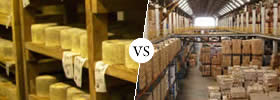Difference between Jalebi and Imarti
Key Difference: Jalebi is a sweet dish that is made from all- purpose flour or maida. Imarti is made from black lentil flour. Both the batters are then deep friend in ghee or oil and soaked in sugar syrup. Jalebi is crispier and stickier, while Imarti is soft and chewy.
 Sweets play a huge part in cultures as they are popular treats that are used on many occasions. Mainly, sweets are used to rejoice or celebrate an occasion such as during festivals or weddings, etc. Many Indian sweets are made using three main components, sugar/jaggery, milk and whole purpose flour. However, the process and certain differences in ingredients cause the dishes to separate from each other. Jalebi and Imarti are two different sweets that are largely popular in India, Pakistan, Sri Lanka, Nepal, Bangladesh and various other countries in Southeast Asia.
Sweets play a huge part in cultures as they are popular treats that are used on many occasions. Mainly, sweets are used to rejoice or celebrate an occasion such as during festivals or weddings, etc. Many Indian sweets are made using three main components, sugar/jaggery, milk and whole purpose flour. However, the process and certain differences in ingredients cause the dishes to separate from each other. Jalebi and Imarti are two different sweets that are largely popular in India, Pakistan, Sri Lanka, Nepal, Bangladesh and various other countries in Southeast Asia.
Jalebi and Imarti, often become confusing for many people because of the similarities in their making process and how they look at the end. However, avid sweet lovers will tear you apart if you every say that these two are the same or variants of each other. Jalebi and Imarti are considered as two different types of sweets/desserts that are available.
The major difference between the two lies in the batter that is made. Jalebi uses all-purpose flour or maida in its batter, while Imarti uses urad-dal (black gram/black lentil) flour in its batter.
Jalebi also written as Jilawii or Jalibi is a dish that originates in the north and the East, although now because of its popularity, it is now available all over India and other places such as Iran, Iraq, Jordan, Syria, Palestine, Lebanon, Egypt, Tunisia and Algeria. Jalebi is made by creating a batter of all-purpose flour that is deep-fried and later soaked into sugar syrup. Jalebi is consumed with milk or with some sugar syrup. The recipes for Jalebi differ based on the region where it is being made.
The ingredients required for a simple recipe of Jalebi mentioned on Chef Sanjeev Kapoor’s website is as follows:
Refined flour (maida) – 1 cup
Yogurt – ½ cup
Sugar – 3 cups
Milk – 1 tablespoon
Saffron (kesar) – a pinch
Ghee/ Oil – for deep frying
 Imarti, also know as Jaangiri, Emarti or Omriti, is a dish that originates in Rajasthan, West Bengal and South India. Imarti is made by creating a batter of urad dal or black lentil, which is then deep fried in a circular shape with a hole in the middle and soaked in sugar syrup. Imarti was considered as one of the dishes to make the Raj Bhog (Royal Menu). In some places, Imarti is consumed with condensed milk. The sugar syrup may also contain additional spices such as saffron, cardamom powder, rose essence, etc. Imarti is similar to funnel cakes, which are found in North America. The recipes for Imarti differ depending on the region where it is made.
Imarti, also know as Jaangiri, Emarti or Omriti, is a dish that originates in Rajasthan, West Bengal and South India. Imarti is made by creating a batter of urad dal or black lentil, which is then deep fried in a circular shape with a hole in the middle and soaked in sugar syrup. Imarti was considered as one of the dishes to make the Raj Bhog (Royal Menu). In some places, Imarti is consumed with condensed milk. The sugar syrup may also contain additional spices such as saffron, cardamom powder, rose essence, etc. Imarti is similar to funnel cakes, which are found in North America. The recipes for Imarti differ depending on the region where it is made.
The ingredients required for a simple recipe of Imarti is as follows:
Split black gram skinless – 1 cup
Rice – ¼ cup
Orange red color – as required
Sugar – 5 cups
Saffron – a pinch
Rose essence – 6 drops
Green cardamom powder – 1 teaspoon
Olive oil or any other type of oil – for deep frying.
In addition to differences in flour that is used and additional spices that are required in Imarti syrup, certain jalebi recipes require yogurt or some sort of milk based product in the batter, while Imarti recipes usually don’t. Imartis are also more into a set circular shape, while jalebis are made in a free fall shape of twists and turns. Jalebis are also soaked longer, while Imartis are soaked only until they absorb a good amount of syrup and puff up. Both Jalebis and Imartis can be served with rabri (condensed milk) or plain milk. Jalebis are also sticker and crispier, while Imartis are softer and less sticky.
Image Courtesy: rakskitchen.net, en.academic.ru









Add new comment